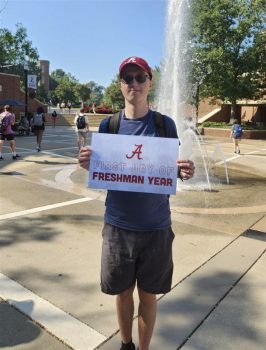
Dr. Steven Daniewicz
The University of Alabama is hosting a week of celebration for first-generation college students from Nov. 6-11. With support, recognition and celebration as the foundational elements of the week, the College of Engineering decided to sit down with two first-generation college students to learn more about their experiences and the advice they have for other first-generation students.
Dr. Steven Daniewicz is a first-generation college student and the head of the College’s department of metallurgical and materials engineering. He received his graduate degrees in welding engineering and mechanical engineering from Ohio State University and he is a member of the American Society for Testing and Materials (ASTM) E08 Committee on Fatigue and Fracture. There, he not only serves as chairman of the research and education subcommittee, but he is also an ASTM fellow and representative for the U.S. National Committee on Theoretical and Applied Mechanics.
Patrick Bartoszewicz is also a first-generation college student and freshman majoring in computer science. Originally from Knoxville, Tennessee, Bartoszewicz was hesitant at first about attending an out-of-state school. After taking a campus tour and learning about the resources the University provides to help students succeed, he decided to apply and pursue his education at the Capstone. Bartoszewicz hopes that when he walks across the stage he can work in computer science and continue to develop his coding skills to potentially develop his own project.
Dr. Steven Daniewicz
1. What does being a first-generation college student mean to you?
I feel good. I feel like I accomplished something that most people did not see as a possibility. I am always eager to try and talk with students who are in a similar situation. Maybe it looks difficult, and it probably will be, but if you are willing to work, you can do it.
2. Tell us a little bit about your background and your journey to attending college.
In high school, I was the kid who got kicked out of algebra class when I was a sophomore. In those days, there were shop classes. I spent more time in the shop than I did in a conventional classroom. I graduated and I did not do anything for a year except for work at a Walgreens full time. I decided to go to a two-year community college in the Arizona town I grew up in. I had no intentions of going to school beyond that, but I decided to do two more years and go to Arizona State. They have a welding engineering technology program and I could plug in my two year degree in welding. I was a little bit overwhelmed when I got there. I found myself in a physics class and they were using trigonometry. I have never had trigonometry and I had gaping holes in my background with math and science. That was an enormous struggle trying to dig out of that hole, but I made it work, and I got some confidence. I was able to get through all of that and earned my bachelor’s degree. Afterward, I decided to go to Ohio State because they have a nationally regarded welding engineering program. It was not the mathematical rigor I anticipated. So when I finished my master’s, I went across the street to the doctoral program in mechanical engineering and I got more rigor than I could have ever asked for. I never really planned any of it, but I really had to work harder than the average student because of all of the holes in my background. Looking back, that made it a lot harder than it needed to be.
3. Why did you choose to make attending college a priority?
People doubted me, so I wanted to prove them wrong. I do not think my parents believed I could do it, and a lot of people had their doubts. Every time I took it a step further and got an additional degree, I was kind of taunting my doubters a little bit. It felt good to turn a doubter into a believer.
4. What hurdles did you experience as a first-generation college student and how did you overcome them?
Having to teach myself enough trigonometry to pass a physics class. I do not know if there were any greater hurdles than that.
5. What advice would you give to other first-generation college students or to anyone who feels like they are not capable of attending college because of family history?
I am the kid who got kicked out of algebra class and taught myself trigonometry to pass a physics class. I never had an IQ score or an ACT test score or any numbers attached to how smart or not smart I am. The secret to anybody’s success, including mine, is you just have to want it. You have to work. If you work hard enough, you can overcome gaping holes in your background and persevere. If the kid from Yuma, Arizona, who never took trigonometry can do it, you can too.

Patrick Bartoszewicz
1. What does being a first-generation college student mean to you?
To me, being a first-generation college student means that I am the first person in my family to pursue a degree at a college. My parents both immigrated here from Poland, so they never really had the chance to attend a university or four-year college here, although they still found successful careers. However, this did not dissuade me from attending college, and I was confident that I would still be able to succeed in college regardless of my circumstances.
2. Tell us a little bit about your background and your journey to attending college.
Growing up, my parents always told me that I should go to college once I was old enough and, for a time, I thought that was what everyone did. Even after I realized I didn’t have to, I still wanted to attend college in hopes that I could learn more and get a degree that would help me get a job. Deciding to major in computer science only motivated me more to go to college and I was excited thinking about the opportunities I would receive as a result.
3. Why did you choose to make attending college a priority?
I knew that regardless of what I could learn through being self-taught, having a professor who is experienced and knowledgeable in the field I chose would help me learn and understand the subject much easier. At a college campus, it would also be easier to ask questions whenever I have a problem since professors are generally more than willing to help a student and talk them through any topics they do not fully understand.
4. What hurdles did you experience as a first-generation college student and how did you overcome them?
One of the biggest hurdles I experienced was that my parents never went through the college process. Since they never attended a four-year college themselves, they did not know what to expect or what we should do, so I did not start looking at colleges until my senior year. We started most things later than we should have. However, even though we did things a bit late, we still got things done. My dad took me on a lot of campus tours in my senior year, and whenever I heard about something I had to do for college, I tried to get it done early. I also did not start thinking about my GPA until my junior year of high school, but I still managed to bring it up enough to help me in the college search process.
5. What advice would you give to other first-generation college students or to anyone who feels like they are not capable of attending college because of family history?
Whether or not your family went to college is not an impossible obstacle to overcome because there are plenty of resources on campus to help you adapt and get used to your college experience. If you feel that you do not know anybody at college, there are plenty of events taking place on campus that you can go to in order to meet new people. If you just are not sure about what to do on campus, places like the Capstone Center for Student Success will be able to help you. No matter what issues or worries you may face, just remember you are not alone and there are many people on campus willing to help you out.
To learn more about The University of Alabama’s community of first-generation students and the resources offered to students, visit the First-Generation Programs website.